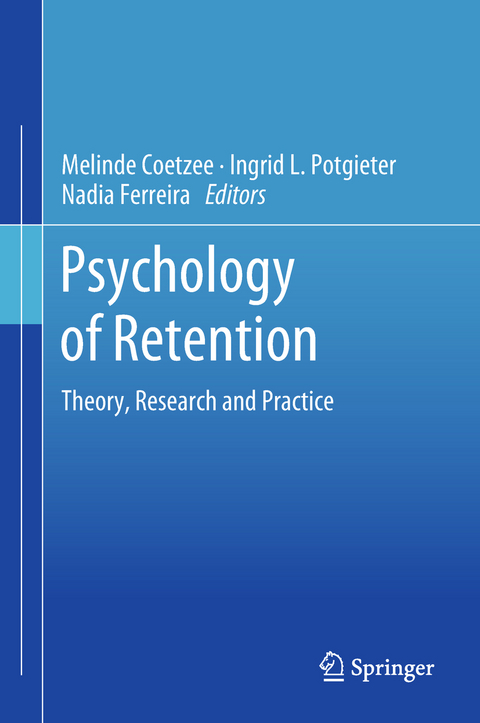
Psychology of Retention
Springer International Publishing (Verlag)
978-3-319-98919-8 (ISBN)
Melinde Coetzee (DL itt et Phil) is a professor in the Department of Industrial and Organisational Psychology at the University of South Africa. She has 14 years of experience in organisational development, skills development and HR management in the corporate environment and has been lecturing subjects such as Personnel, Career, Organisational and Managerial Psychology since 2000 at undergraduate, honours and masters levels. She also presents short learning programmes in skills development facilitation through Unisa’s Centre for Industrial and Organisational Psychology. Melinde is a professionally registered Industrial Psychologist with the Health Professions Council of South Africa (HPCSA) and a master human resource practitioner with the South African Board for People Practice (SABPP). She is Chief Editor of the South African Journal of Industrial Psychology and also the author, co-author and editor of a number of academic books. She has published in numerous accredited academic journals. She has also co-authored and contributed chapters to books nationally and internationally. She has presented numerous academic papers and posters at national and international conferences. Ingrid Potgieter (DCom) is an Associate Professor in Human Resource Management at the Department of Human Resource Management at UNISA. She is a registered industrial psychologist at the Health Professions Council of South Africa (HPCSA) since 2009 and also a registered human resource practitioner and the South African board for people practices (SABPP). She is also an author and co-author of several published articles in local and international journals. In addition, she presented several papers at national and international conferences. Nadia Ferreira (DCom) is an Associate Professor in Human Resource Management at the Department of Human Resource Management at UNISA. She is a registered human resource practitioner with the South African Board for People Practices (SABPP). She is also an author and co-author of several published articles in local and international journals. In addition, she presented several papers at national and international conferences.
Chapter 1. The digital disruption of everything (John Ludike).- Chapter 2. The employee value propositions as a talent retention mechanism in the VUCA world (Dieter Veldsman).- Chapter 3. A framework for understanding turnover intention (Gert Roodt).- Chapter 4. Psychological factors that influence turnover intention: Are they similar across Professional and Administrative job-types? (Leon de Beer).- Chapter 5. The influence of personal attributes on retention (Ingrid L. Potgieter).- Chapter 6. Capitalising on employee's psychological wellbeing attributes in managing their retention (Melinde Coetzee).- Chapter 7. The Flow@Work model as a talent retention framework for the knowledge economy (Dieter Veldsman).- Chapter 8. Using the Job Embeddedness Theory as a Tool for Improving Employee Retention (Brooks C. Holtom).- Chapter 9. Job Demands, Job Resources and Employee Turnover: The Mediating Effects of Flourishing at Work (Ian Rothmann).- Chapter 10. Talent retention strategies: The role of self-regulatory career behaviour among working adults (Nadia Ferreira).- Chapter 11.Multi-generational workforce and its implications for talent retention strategies (Violetta Khoreva).- Chapter. 12. Millennial and psychological contract: Social constructivist approach (Ade Ima Anggraeni).- Chapter 13. Millennial employees' retention challenge? Mentoring is the solution ) Mohammad Faraz Naim).- Chapter 14. The same but different: Implications of variation in anticipatory psychological contracts for retention of young talents(Nada Zupan).- Chapter 15. Barriers to older people's retention in non-profit organizations: A literature review and conceptual framework (Rodrigo Serrat).- Chapter 16. A psychological retention profile: The role of the psychological contract in predicting satisfaction with retention factors (Alda Deas).- Chapter 17. Effects of job embeddedness on organizational citizenship behavior and organizational identification (R. Anbumathi).- Chapter 18. - Remuneration solutions to retention questions (Mark Bussin).- Chapter 19. Total rewards as retention-related dispositions influencing the retention employees (Calvin Mabaso).- Chapter 20. The organisational strategic business context, strategy and the alignment with talent management best practices that deliver real business benefits (Francois Du Plessis).
| Erscheinungsdatum | 15.09.2018 |
|---|---|
| Zusatzinfo | XIX, 440 p. 23 illus., 10 illus. in color. |
| Verlagsort | Cham |
| Sprache | englisch |
| Maße | 155 x 235 mm |
| Gewicht | 821 g |
| Themenwelt | Geisteswissenschaften ► Psychologie ► Arbeits- und Organisationspsychologie |
| Medizin / Pharmazie ► Medizinische Fachgebiete ► Psychiatrie / Psychotherapie | |
| Studium ► Querschnittsbereiche ► Prävention / Gesundheitsförderung | |
| Sozialwissenschaften ► Soziologie | |
| Wirtschaft ► Betriebswirtschaft / Management ► Personalwesen | |
| Schlagworte | job embeddedness • Multi-Generational Workforce and Retention • psychological contract • Psychological Factors in Retention • Psychology of Retention • Remuneration Solutions for Retention • Retention • Retention Barriers • Strategic Business Context and Retention • Talent Retention Strategies • Turnover Intention |
| ISBN-10 | 3-319-98919-7 / 3319989197 |
| ISBN-13 | 978-3-319-98919-8 / 9783319989198 |
| Zustand | Neuware |
| Haben Sie eine Frage zum Produkt? |
aus dem Bereich


